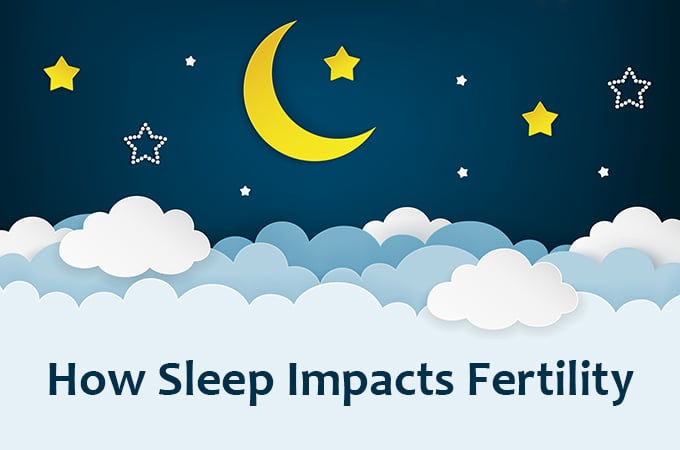Sleep, or more importantly, a lack thereof can affect fertility both directly and indirectly. Poor sleep and an altered sleep schedule can impact weight, stress, and sleep regulation all of which can affect fertility levels. This is because several hormones are influenced by sleep, including insulin, ghrelin, leptin, and cortisol. Cortisol can trigger the release of reproductive hormones, and a long-term lack of sleep can affect the hormone in charge of regulating a person’s menstrual cycle. It’s not just how much sleep you get but when you get that sleep that can impact your chances of conception.
Sleep and Weight
The relationship between sleep and obesity is rather complex. Poor sleep contributes to obesity, but obesity can further limit the body’s ability to sleep. It’s a cycle that can be hard to break.
Obese women may have irregular menstrual cycles, an excess of the hormone androgen, and a higher risk of miscarriage. Excess androgen also increases the risk of polycystic ovarian syndrome (PCOS) and its accompanying fertility issues, and nearly one-third of women with this condition are obese. Obese men face fertility issues due to changes in estrogen and androgen levels, scrotal temperatures, and an increased risk of sleep apnea.
At the same time, sleep deprivation is often associated with obesity because lack of sleep changes how the body releases hunger and satiety hormones. Whenever you get less than 7 hours of sleep, the body releases more hunger hormone and less satiety hormone. Consequently, you’re more likely to overeat and experience weight gain.
Lack of sleep also affects food cravings. Your brain gets a reward when you eat food. However, when you’re sleep deprived, the reward center takes a bigger hit than normal from foods loaded with fat and sugar. One study found that sleep-deprived participants choose snack foods with 50 percent more calories and twice the fat in comparison to when they were well rested.
[WATCH: SGF’s Weight and Fertility On-Demand Webinar]
Stress and Sleep
Stress can get in the way of sleep, which sets the body up for a variety of issues that aren’t conducive to fertility. Stress can change how key factors like the HPA axis function. The HPA axis exerts a portion of control over reproduction hormones, follicle development, and menstruation. Stress can cause it to reduce uterine receptivity and/or suppress reproductive hormones.
The HPA axis can also influence melatonin levels, further affecting the sleep cycle and, without enough sleep, stress can rise due to changes in the way the brain processes emotions during sleep deprivation. It’s another cycle that can stand in the way of fertility.
For many women, their stress levels may already be high when they are trying to conceive or begin treatment. When you begin fertility treatment, we strongly recommend patients to join a support group. Some even find services such as acupuncture or massage offered at the Wellness Center at SGF to be helpful. While these alternative therapies have not been proven to increase conception rates, these activities have helped many patients better manage the emotional stress of infertility and support them before and during treatment.
The Timing of Your Sleep Cycle
Altered timing of your sleep cycle can significantly impact fertility. A study published in Occupational and Environmental Medicine found that women who work longer hours or overnight shifts have lower fertility rates as do those who have jobs where heavy lifting and physical labor is involved. Shift work puts the body at odds with the natural timing of the circadian rhythms, which rely on exposure to sunlight to time the sleep cycle. Problems with circadian rhythms can cause issues with melatonin levels, inflammatory responses, and lower fertility due to changes in reproductive hormones.
Better Sleep through Healthy Habits
Better sleep can have a positive impact on your overall health and fertility. You can start by:
- Creating Ideal Sleep Conditions: Complete darkness, cool temperatures, and a quiet room give the body what it needs for restful sleep. Add a supportive mattress and pillow, and you’ve set the stage for sleep success.
- Being Consistent in Your Sleep Habits: Let your body adapt to your schedule. Go to bed at the same time every night and lead into sleep with a relaxing bedtime routine.
- Avoiding Stimulants: Stimulants like caffeine block sleep hormones for several hours. Give yourself the best chance at sleep by avoiding them in the afternoon and evening.
The factors that contribute to fertility, like sleep, can be many and complex. It may take time to build and strengthen healthy sleep habits, but as you do, you’re improving overall health and your chances of successful conception.
Disclaimer: This guest blog was provided as in-kind educational service by Sleep Help. Shady Grove Fertility (SGF) does not control or endorse products offered by Sleep Help.
Medical contribution by Eric A. Widra, M.D.
Eric A. Widra, M.D., is the Executive Senior Medical Officer for Shady Grove Fertility and the associate director of the Combined Federal Fellowship in Reproductive Endocrinology and Infertility—a post-graduate training program for future leaders in this subspecialty, operated through the National Institutes of Health, Walter Reed National Military Medical Center, and Shady Grove Fertility.
To learn more or to schedule an appointment with an SGF physician, please contact our New Patient Center at 877-971-7755 or fill out this brief form.







